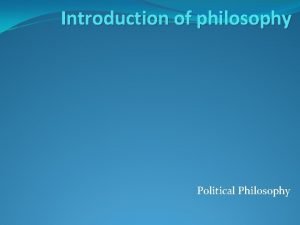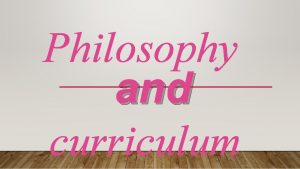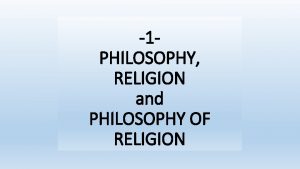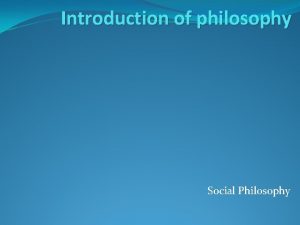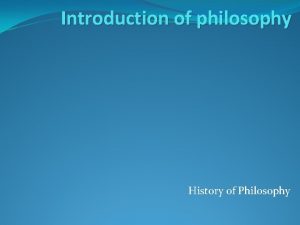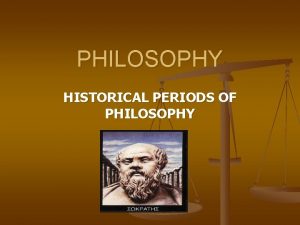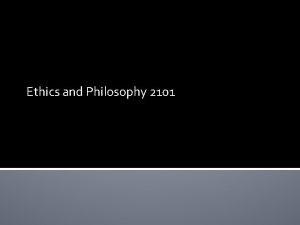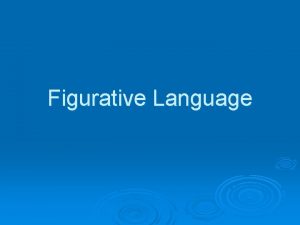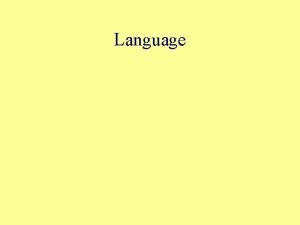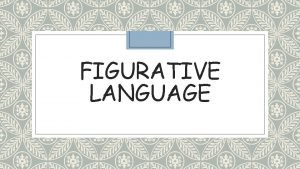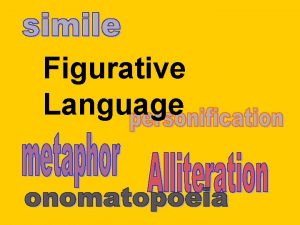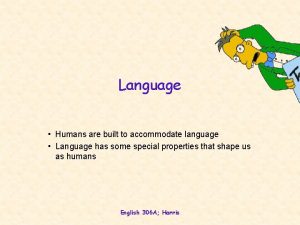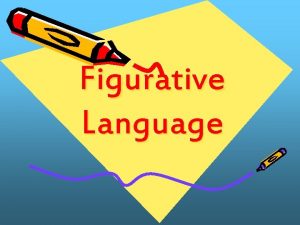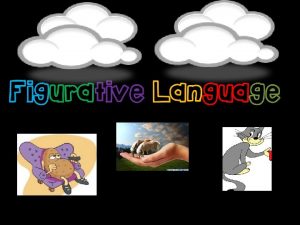What is the Philosophy of Language Philosophy of
































- Slides: 32

What is the Philosophy of Language?

Philosophy of language is the study of philosophically interesting issues concerning language. Many of these issue involve the semantic (or “meaning”) properties of language.

Semantic Properties • The French sentence ‘il pleut’ means that it’s raining. • That sentence is true if and only if it’s raining. • The French word ‘chien’ applies to dogs; dogs satisfy ‘chien. ’ • The name ‘Victor Hugo’ refers to a certain person; sentences containing the name are about Victor Hugo.

Interesting Features Semantic properties/ relations are interesting for a number of reasons. Normally, we see the following patterns: • If Fred kicked George, then George exists. • If Fred kicked George, then there is someone Fred kicked. • If Fred kicked George, and George is the sneakiest Russian spy, then Fred kicked the sneakiest Russian spy.

Interesting Features However, • ‘Sherlock Holmes’ means Sherlock Holmes, but Holmes does not exist. • ‘Santa Claus’ means Santa Claus, but there isn’t anyone whom ‘Santa Claus’ means. • ‘Ben Franklin’ means Ben Franklin, and Ben Franklin is the inventor of bifocals, but ‘Ben Franklin’ does not mean the inventor of bifocals.

Interesting Features Language can mean or be about thing that don’t exist. Also, even when they are about things that do exist (Ben Franklin), they simultaneously are not about those very same things (the inventor of bifocals). That’s all very weird.

Naturalizing Meaning The weirdness of representation makes it difficult to see how it fits into “the natural order. ” As we’ll see, various proposals about why some things have meanings and others don’t, and why things that have meanings have the ones they do, haven’t worked out to everyone’s satisfaction.

Original vs. Derived Meaning One strategy for dealing with the problem of linguistic representation is to say that words represent what our thoughts represent (since thoughts too can be about things and be true or false). This pushes the problem back to how thoughts can represent, but maybe this is easier to explain.

The Idea Theory One theory popular in the Early Modern period in Europe was the idea theory. According to this theory, words stood for ideas and ideas represented things. Derivatively, words represented what the ideas they stood for represented. Ideas were like mental pictures, and they represented the world by resembling it. (Obviously can’t work for words: ‘dog’ doesn’t resemble dogs. )

Problems for the Idea Theory For a large number of reasons (that we’ll cover in detail next class), the idea theory went out of fashion. Here’s just one such reason: if A resembles B, then B resembles A. But it’s not true that if A represents B, then B represents A. Therefore representation is not resemblance.

Verificationism A subsequent view that became popular in early 20 th Century Anglophone philosophy was called ‘verificationism. ’ Roughly stated, the verificationist position was that words stood for experiences, and experiences represented what they verified. Here, an experience verifies X = whenever you have that experience, X is true.

Verificationism So the meaning of ‘it’s raining’ would be the set of experiences such that if you were having those experiences, then it was raining. We’ll consider verificationism in greater detail, but one objection worth thinking about is that it seems to count past-tense sentences as meaningless. What experiences that you now have can verify “Caesar crossed the Rubicon”?

The Description Theory Verificationism was a kind of description or definition theory. Some words stood for certain experiences, but other words were defined from the ones that stood for experiences. This is another common strategy in lessening the amount of work we have to do to understand meaning. Some words “inherit” their meanings from others via definitions.

The Description Theory But the definition strategy is broader than verificationism. You can deny that words stand for experiences and still say that some (perhaps a great many) words get their meanings by definition. And maybe all of them do? Part of the problem with the description theory has been that there are so few convincing definitions.

The Causal-Historical Theory The causal-historical theory, which I can’t go into great detail on here, is the view that my words don’t have their meanings because of the ideas/ experiences/ definitions that I associate with them, but rather they simply “inherit” their meanings from the people whom I learnt the words from. Mental representation is required for the original “attachment” of meaning (reference fixing) but not its preservation.

One Problem One problem for the causal-historical theory is that sometimes words change their meanings (that is, they don’t inherit them from prior uses of those words)– and sometimes this change is unintentional and unobserved. Through a misunderstanding, ‘Madagascar’ has come to name an island off the coast of Africa. According to the causal-historical theory, this shouldn’t be so: the inheritance of meanings doesn’t care about understanding or misunderstanding.

The Use Theory Some words are very difficult to handle on theories of meaning we’ve discussed– words like ‘not’ and ‘and. ’ What mental picture does ‘and’ stand for? What experience? Can you define ‘and’ with other words? These questions are difficult, or impossible to answer.

The Use Theory One view is that ‘and’ means what it does because of how it’s used in inference. From ‘A and B’ we can infer A and we can infer B. We can’t infer A from ‘A or B. ’ From A and B, we can infer ‘A and B. ’ We can’t infer ‘A and B’ from just A, however (cf. ‘A or B’).

The Use Theory The difficulty is to make this idea work for other expressions. Use theorists have certainly tried, but it’s difficult to explain, for example, what premises you can infer ‘x is a tree’ from, and what conclusions you can draw from ‘x is a tree. ’ It seems saying this would require you to have a definition of tree (which, as I’ve said, is difficult to come by).

Infinite Meanings Moving beyond theories of meaning, there are other issues in the philosophy of language. One interesting one is how it’s possible that we can understand a potential infinity of novel utterances– sentences we’ve never heard before in our life.

Novelty Before now you’ve never heard the sentence, “Little purple gnomes, wearing red tracksuits, are disco-dancing on the ceiling of Run Shaw Tower. ” Still, you understand what it means without effort.

Infinity And there are infinitely many meaningful sentences that you have yet to hear, but would understand immediately. Here’s the proof. For any meaningful sentence that’s N words long, there is another meaningful sentence that’s N + 3 words long: take the original and append ‘Michael believes that’ to the front.

Compositionality A much-favored solution among philosophers (and linguists and computer scientists) is called compositionality. This is the claim that we can understand infinitely many sentences, because the meanings of sentences depend only on what their parts mean, and there are only finitely many parts (individual words).

Semantic Paradoxes There a number of paradoxes associated with semantic properties. We’ll be looking at them later in the semester, but here is one known as Grelling’s paradox. First, we define the terms autological and heterological.

Autological Adjectives An adjective is autological if and only if it applies to itself. Examples: • • ‘Short’ is short ‘English’ is English ‘Adjectival’ is adjectival ‘Polysyllabic’ is polysyllabic

Heterological Adjectives The heterological adjectives are all the rest, the ones that don’t apply to themselves: • • ‘Long’ is not long ‘German’ is not German ‘Nominal’ is not nominal ‘Monosyllabic’ is not monosyllabic

Grelling’s Paradox Here’s a question then: is the adjective ‘heterological’ heterological? Suppose we say ‘yes. ’ Then ‘heterological’ is heterological. By definition then, ‘heterological’ does not apply to itself. Thus ‘heterological’ is not heterological.

Grelling’s Paradox Suppose instead we say ‘no, ’ ‘heterological’ is not heterological. Then it does not apply to itself, so by definition ‘heterological’ is heterological. The contradiction seems to arise from assuming the reasonable principle that if ‘red’ applies to x, x is red; if ‘big’ applies to x, x is big; and if ‘heterological’ applies to x, x is heterological.

Paradoxes of Vagueness Paradoxes also seem to arise when we consider vague expressions– expressions that have borderline cases. Many adjectives are vague– ‘bald, ’ and ‘rich. ’ are examples. Sometimes it’s not clear whether someone is bald or whether they’re rich. There also non-vague adjectives, like ‘pregnant. ’

No Sharp Boundaries For vague terms, it seems there are no sharp boundaries. This means something like: if someone is bald, adding one hair to their head won’t make them not bald, and if they are not bald, taking one hair away won’t make them bald.

The Slippery Slope But now consider this argument: 1. Someone with 1 hair is bald. 2. So someone with 2 hairs is bald [No Sharp Boundaries] 3. So someone with 3 hairs is bald [No Sharp Boundaries] … So someone with 10 million hairs is not bald.

What do we do? We can’t believe that someone with 1 hair is bald AND that someone with 10 million hairs is not bald AND that there are no sharp boundaries. But all three claims seems unimpeachable. If we reject No Sharp Boundaries, for instance, we have to say that its possible to go from bald to not bald by losing one hair!
 Hình ảnh bộ gõ cơ thể búng tay
Hình ảnh bộ gõ cơ thể búng tay Bổ thể
Bổ thể Tỉ lệ cơ thể trẻ em
Tỉ lệ cơ thể trẻ em Gấu đi như thế nào
Gấu đi như thế nào Thang điểm glasgow
Thang điểm glasgow Hát lên người ơi
Hát lên người ơi Các môn thể thao bắt đầu bằng tiếng chạy
Các môn thể thao bắt đầu bằng tiếng chạy Thế nào là hệ số cao nhất
Thế nào là hệ số cao nhất Các châu lục và đại dương trên thế giới
Các châu lục và đại dương trên thế giới Cong thức tính động năng
Cong thức tính động năng Trời xanh đây là của chúng ta thể thơ
Trời xanh đây là của chúng ta thể thơ Mật thư tọa độ 5x5
Mật thư tọa độ 5x5 Làm thế nào để 102-1=99
Làm thế nào để 102-1=99 Phản ứng thế ankan
Phản ứng thế ankan Các châu lục và đại dương trên thế giới
Các châu lục và đại dương trên thế giới Thơ thất ngôn tứ tuyệt đường luật
Thơ thất ngôn tứ tuyệt đường luật Quá trình desamine hóa có thể tạo ra
Quá trình desamine hóa có thể tạo ra Một số thể thơ truyền thống
Một số thể thơ truyền thống Cái miệng bé xinh thế chỉ nói điều hay thôi
Cái miệng bé xinh thế chỉ nói điều hay thôi Vẽ hình chiếu vuông góc của vật thể sau
Vẽ hình chiếu vuông góc của vật thể sau Biện pháp chống mỏi cơ
Biện pháp chống mỏi cơ đặc điểm cơ thể của người tối cổ
đặc điểm cơ thể của người tối cổ V. c c
V. c c Vẽ hình chiếu đứng bằng cạnh của vật thể
Vẽ hình chiếu đứng bằng cạnh của vật thể Phối cảnh
Phối cảnh Thẻ vin
Thẻ vin đại từ thay thế
đại từ thay thế điện thế nghỉ
điện thế nghỉ Tư thế ngồi viết
Tư thế ngồi viết Diễn thế sinh thái là
Diễn thế sinh thái là Dạng đột biến một nhiễm là
Dạng đột biến một nhiễm là Thế nào là số nguyên tố
Thế nào là số nguyên tố
































